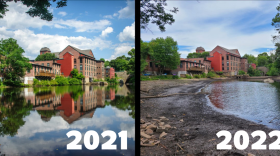Around New England, several states are experiencing severe drought. That includes almost all of Massachusetts. Wells and reservoirs are at all-time lows, so are streams and rivers. The rain earlier this week helped, but it wasn't enough.
In Granby, Massachusetts, at Red Fire Farm some fields are looking worse than others.
"We have one field that we were irrigating early in the year with drip irrigation, and it was going fine. We were growing some of our early summer cabbage there and broccoli and some kale," said Ryan Voiland.
He and his wife own the hundred plus acre farm with a retail store and wholesale business.
"That particular field we were irrigating from a stream, that stream suddenly just dried up," he said.
Where he can irrigate Voiland said, things will grow. But he can't get to every field and he has had to make some tough choices. Plants are visibly wilting because of this summer's severe drought.
For many New England farmers, irrigation used to be a supplement for relatively regular rainfall.
It takes Voiland an hour-and-a-half just to set up a giant sprinkler and hose. Most days during the drought he has started watering at 4:30 a.m. He shuts it all down sometimes at 11 p.m. That is after a full day of running the farm in Granby and in Montague.

Most summer crop harvests in Massachusetts will be smaller this year — at a time when inflation has made supplies more expensive. Fuel and labor costs are high. Voiland and other farmers have had to raise their prices.
While heat and drought did make peaches sweeter this year, Ben Clark at Clarkdale Farm in Deerfield, Massachusetts, said it has been rough.
"In western and central Mass. ...it's the biggest drought in my memory. And my father has been farming for 50 years here. This is the driest summer he's seen," he said.
The trees in his fourth generation orchard have been stressed, but older trees have deep roots and find water, Clark said. Those are bound to do better than the new types of trees he and other fruit growers are now planting.
"More efficiency, higher yield. They're small trees with a small root system and really need the water. They require it, otherwise they won't survive, " he said.
Clark is president of the Massachusetts Fruit Growers Association, which is looking ahead to the apple season — big business in New England. There will be less to harvest, but there will be a crop.

Hameed Bello and his wife manage a small urban farm in Wilbraham, Massachusetts — Agric Organics. They sell a variety of vegetables at farmers markets around Springfield.
"Carrots, kale, collard greens, eggplants. We also have a small orchard on the farm that we get our fruits from," he said.
Bello, who's also a pharmacist, says they lost a few thousand dollars with the drought. Mostly the salad greens, which bolted early and went to seed. But Bello said this weather crisis is also a learning experience.
"Something that we've been doing is trying to look for different ways to mitigate our crop loss and also to reduce the amount of water that has been evaporated from our fields," he said.
Techniques like using wood chips between rows and letting the weeds grow for shade, which Bello first learned growing up in Nigeria.
The last major drought in western Massachusetts was in 2016. Since then farmers are paying more attention to soil health, said Masoud Hashemi, of the University of Massachusetts Amherst's School of Agriculture. They are tilling less and growing cover crops after a harvest, like rye and winter wheat, Hashemi said, instead of leaving a bare field before the next crop goes in. That process will create powerful microbes in the dirt.
"Those microbes are usually short lived and they die within a few weeks and once they die... organic matter works like a sponge, so actually they hold the water," he said.
With this extreme weather — brought on by climate change —some welcome rain fell earlier this week. More of it could make all the difference for the winter squash and pumpkins that usually get picked off their vines in the fall.










